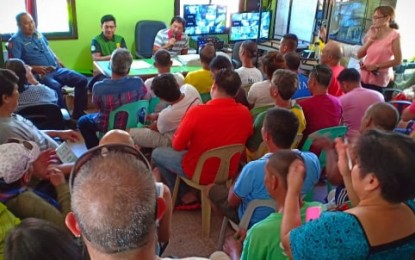
GUIDANCE ASSURED. Drug surrenderers from Iloilo City’s La Paz district meet with the Philippine Drug Enforcement Agency (PDEA) on Sunday (March 23, 2019) where they got an assurance that they will be guided and monitored as they journey to recovery. (Photo by PDEA 6)
ILOILO CITY -- More than 50 percent of persons who use drugs (PWUDs) and underwent screening and assessment in Western Visayas have availed of rehabilitation, the Department of Health (DOH) here has reported.
As of March 25 this year, 12,036 PWUDs were screened using the World Health Organization’s Alcohol, Smoking, Substance Involvement Screening Test (ASSIST), DOH senior health program officer John Richard Lapascua said in an interview on Monday.
“Rural health centers are capacitated to do screening and assessment services,” Lapascua said.
Following the result of the screening and assessment, 7,620 PWUDs have enrolled in community-based rehabilitation program; 560 in facility-based rehab services while 28 were referred to treatment rehab centers (TRC).
Those enrolled in community-based rehab are assessed to have low to mild drug addiction while those in the facility-based rehab have moderate addiction. Those with severe addiction are referred to the TRC.
In a previous interview, Lapascua said the community rehab provides complete package of social, physical, emotional, mental and spiritual activities for PWUDs with low addiction for one month. Those with mild level of abuse have to undergo four-month rehabilitation;
On the other hand, those with moderate level of abuse will have to undergo a health facility-based patient rehabilitation for six months and will be placed under the care of municipal/city health officers who completed the intensive outpatient program training.
PWUDs with a severe level of abuse have to undergo two years of rehabilitation composed of six months in-patient rehabilitation and 18 months after care.
However, he said that local government units have been urged to start with their own rehab centers because not all LGUs in the region have established centers.
“The implementation varies in every LGU. There are those that are supportive, thus the conduct of screening and rehabilitation is faster.
He also reminded PWUDs that after they surrender to the PNP, they should undergo screening. He added that there are PWUDs who after giving themselves up to the police have failed to go back for the assessment and screening.
A year ago, the region has close to 37,000 drug surrenderers from its five provinces and two highly-urbanized cities.
“We are calling on our drug surrenderers not to be afraid to seek help because we have to remember that drug use is an addiction. Addiction is considered a medical problem that is why one way to treat addiction is really to seek medical help. Surrendering doesn’t mean the end of the world but it is the first step towards healing from addiction,” he said. (PNA)
